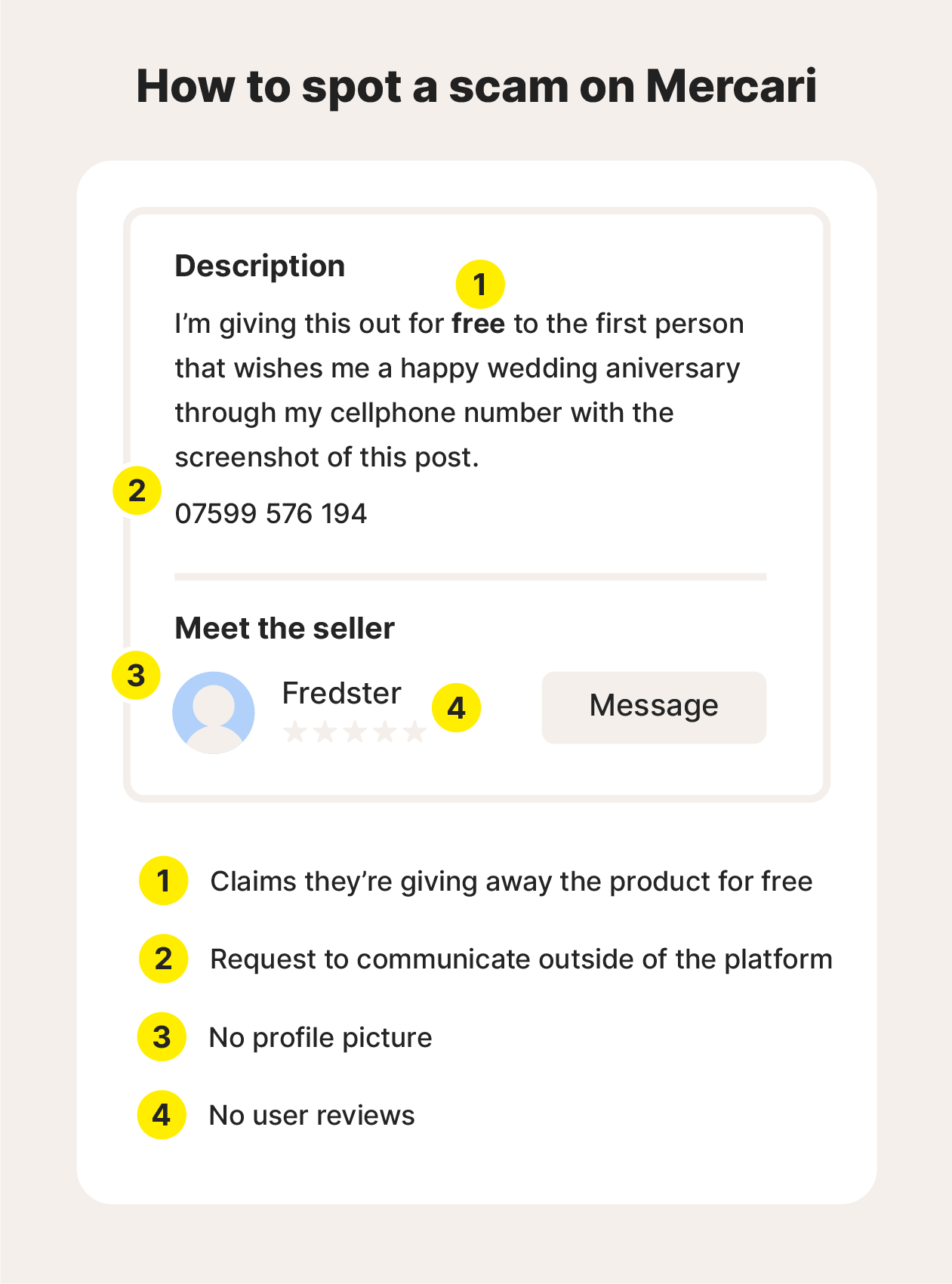Is Mercari legit? 8 Mercari scams to watch out for
Buying secondhand items with just a few clicks sounds convenient — until a rock shows up in the mail instead. Learn about common Mercari scams and how to spot them. Then get robust AI-powered scam protection from Norton to help safeguard your personal information and protect against online threats.

Mercari is a popular online marketplace app where users can buy or sell secondhand goods. While the platform is legitimate, scammers prowl on Mercari, attempting to swindle users and steal their money, goods, or personal information. And their fake profiles can be hard to distinguish from those of genuine buyers and sellers — unless you know the red flags.
Learning to recognize suspicious behavior can help you spot fraudsters and stay safe while using the platform. Read on to learn about common Mercari scams and how to help avoid them.
1. Fake or counterfeit listings
Mercari, much like sites like Wish or Temu, can host counterfeit products sold by third-party sellers using the platform. In some cases, scammers may send a counterfeit version of the item you purchased; in other instances, they may send a product in far worse condition than depicted in listing photos.
For example, one Reddit user shared their experience purchasing what they thought was a genuine Dior makeup palette on Mercari. At first, they didn’t realize it was counterfeit, but the differences became clear when they compared it to a real version of the product. Unfortunately, because they had already rated the seller, they no longer qualified for a refund under Mercari’s policies.
2. Overpayment scams
Overpayment scams, where fake buyers “accidentally” send too much money in order to get a refund, are one of the oldest tricks in the book. Here’s how this Mercari scam works:
- A fraudster interested in an item requests to pay for it off-site. The seller, unwisely, agrees.
- The fraudulent buyer “accidentally” sends extra money and asks the seller to refund the difference.
- Trying to be accommodating, the seller does so.
- Later, the seller realizes that the buyer’s original payment was fraudulent. This means they lose the money they refunded and, if it’s already been shipped, the item too.
3. Bait-and-switch scams
A bait-and-switch scam occurs when a scammer lists an item but ships something entirely different.
One Reddit user reported receiving a rock instead of the animatronic item they had purchased. In another scenario, a buyer believed they were purchasing a piece of jewelry, only to receive an empty box instead. Sometimes, a far inferior product is sent.
4. Return scams
Mercari return scams involve bad actors exploiting the return process to steal items from honest sellers. Sometimes, a scammer will purchase a product and claim it is faulty to request a refund from Mercari. However, they never return the actual product, leaving the seller out of their item and the money they initially received from selling it.
One variation of the scam involves a buyer who purchases an intact item and then returns a damaged or broken version they already own.
In another example, a user shared that the buyer initiated a return after selling a designer purse. However, upon receiving the returned item, the well-meaning seller noticed that the buyer had removed the screws and hinges from the purse.
5. Phishing
Scammers may claim they’re giving away free stuff, asking you to click on a link to “verify” an item or requesting that you log into your account with your username and password. These phishing links, which can appear in your email inbox, may mimic Mercari’s real URLs and lead to fraudulent pages with copycat branding.
Audacious phishers may even message you within the app and ask for personal information directly. Or they could leave dangerous links in their user bios. The scammer’s ultimate goal is to steal your personal details and potentially commit identity theft.
If you’re unsure if an email is legitimate and suspect phishing, take a screenshot of the email and scan it with Norton Genie, an AI-powered scam-detection tool that will help you identify if the message you’re looking at is real or a scam.


6. Requests to transfer money via a third-party app
Scammers may suggest using a third-party app to complete a transaction. Mercari’s buyer protections only apply to transactions made through the platform. Here’s how this Mercari scam works:
- The buyer reaches out to a seller to purchase an item.
- The seller claims that there’s an issue with their Mercari account and that the buyer needs to pay via a payment app, such as CashApp or Zelle.
- The seller never sends the product after getting paid.
- The buyer isn’t covered by Mercari’s buyer protection since they made the payment outside the app.
7. Fake customer support
Fraudsters can pose as Mercari customer support representatives to steal users’ sensitive data and potentially commit identity theft.
In a typical tech support scam, a fake Mercari “customer support” representative will email you or message you on the platform claiming there’s an issue with your account that urgently needs to be resolved or else your account will be lost for good.
In order to “fix” your account, they’ll send you a link or form to fill out, often requesting data such as your username and password, bank account number, or even Social Security number — which is personal information you should safeguard carefully.
One user shared their experience where a scammer claiming to be from Mercari customer service messaged them that their account was suspended and that they needed to click a link the scammer sent to supposedly verify their bank details within 24 hours to get their account reinstated.
8. Package diversion
Scammers may try to take advantage of Mercari’s 72-hour return window with a deceptive package-diversion scheme. Here’s how it typically unfolds:
- You purchase a product from a fraudulent seller.
- The scammer ships a box of junk through a third-party shipping service.
- After shipping, the scammer changes the delivery address to a random location in your city.
- The package arrives at the wrong address, and you’re unaware of its delivery status.
- By the time you realize you never received your item, the three-day return window has passed, and Mercari denies your refund request.
Is Mercari safe to use?
Mercari is generally a safe online marketplace, although fraudsters can scam unsuspecting users if they’re not careful. Before buying or selling a product on Mercari, review the user’s profile and look for red flags that could indicate a scam.
Does Mercari protect against scams?
Mercari can't prevent 100% of scams on its platform, but it has certain systems in place to protect against them, including:
- Identity verification to prevent fraudsters from withdrawing a sales balance into an account associated with a different name.
- An escrow payment system, where a third party holds the funds until the buyer receives the item.
- A buyer and seller rating system that allows users to check other users’ reputations before initiating a transaction.
- AI technology to automatically detect unsafe transactions.
- Product monitoring to identify and remove counterfeit and stolen goods.
- Returns and compensation for damaged, counterfeit, and defective goods.
Despite these safeguards, some users have experienced issues with returning fraudulent items. According to one user’s account, Mercari refused to issue a refund for a counterfeit product, reportedly claiming there was no noticeable difference between the listing photo and the photo of the item they received, even though the differences were clear.
Users should take their own precautions to avoid scams and not rely solely on Mercari’s systems for protection.
Steps to take after falling victim to a Mercari scam
If you’ve been scammed on Mercari, it’s important to act fast to protect your finances, safeguard your identity, and potentially secure a refund.
Follow these steps if you were targeted by a Mercari scam:
- Alert your bank right away if you shared financial information, such as your credit card or bank account number, with the scammer.
- Report the scam to Mercari by calling (888) 325-2168 or forwarding phishing emails to phish@mercari.com.
- File a report with PayPal if you used the platform as your payment method.
- Initiate a return within 72 hours of delivery to qualify for a refund. Note that Mercari’s policy does not officially permit escalation of claims after the 72-hour window has passed.
- Notify the Federal Trade Commission at reportfraud.ftc.gov.
- Protect your credit by putting a freeze or lock on your credit report, depending on what data the scammer has.
- Monitor your financial accounts for further suspicious activity.
How to avoid scams on Mercari
There are steps you can take to help avoid getting scammed on Mercari. Use these tips to lower your chances of getting scammed:
As a buyer:
- Only pay through Mercari: If a seller requests payment via a third-party app, it’s probably a scam, and you won’t qualify for Mercari’s buyer protection.
- Request additional photos: Always ask the seller for additional photos of the product. Scammers may refuse to provide these if they don’t own the product, and additional images can provide other angles to check for damage.
- Be suspicious of low prices: If the price of an item seems too good to be true, a scammer could be using it to lure buyers. That said, smarter scammers may list items at a price that’s only a little lower than average to seem more legitimate.
- Check the seller’s profile: Review their ratings and reviews, and look for Seller Badges, which Mercari awards for reliability, fast responses, and quick shipping. An incomplete profile with no reviews is a red flag.
- Don’t rate the seller immediately: Make sure you thoroughly evaluate the product before rating the seller. Some scammers may pressure you to rate an item you haven’t received yet. Don’t do this — once you submit your rating, you won’t be able to request a refund.
As a seller:
- Only accept payment through Mercari: Never allow a buyer to pay you via a check or a third-party app.
- Check the buyer’s profile: Look at reviews of other users’ experiences selling to that buyer.
- Take detailed photos of your item: The buyer may try to falsely dispute the condition of your item, so it’s important to take clear photos before shipping.
- Don’t issue refunds outside the platform: If a buyer claims they accidentally overpaid, avoid sending a refund outside the platform.
Shop more safely with Norton
Whether you’re using Mercari or any other online marketplace, fraudsters are on the prowl for your money and personal information.
With powerful AI scam-detection tools, Norton 360 Standard can help protect you from phishing texts masking as messages from Mercari — as well as viruses, malware, and other insidious online threats. Additionally, our built-in VPN encrypts your connection to keep the personal information you send and receive private so you can shop in peace.
FAQs
Does Mercari have buyer protection?
Yes, Mercari protects buyers by holding payments in their system until you receive the item, review it, and rate the seller. If the item is damaged or not as described, you must request a refund within 72 hours of delivery. Once you rate the seller, your payment is finalized, and you’ll no longer be eligible for a refund.
Can you get scammed on Mercari as a seller?
Yes, sellers can get scammed on Mercari. A few common scams sellers should watch out for include overpayment scams, return scams, and requests to communicate or pay for an item off the platform via a third-party app.
Will Mercari refund me if I get scammed?
Mercari may issue a refund if you get scammed, but it depends on the specific circumstances and your eligibility under their return policies. To qualify for a refund, Mercari requires you to file a request within 72 hours of receiving the item, and complete the return form with an explanation of why you’re returning the item and accompanying photos.
However, if the scam occurs outside of the platform, like when you pay through a third-party app, Mercari will likely deny the refund. Always use Mercari’s payment system and follow their guidelines to ensure protection.
Mercari is a trademark of Mercari, Inc.
Editorial note: Our articles provide educational information for you. Our offerings may not cover or protect against every type of crime, fraud, or threat we write about. Our goal is to increase awareness about Cyber Safety. Please review complete Terms during enrollment or setup. Remember that no one can prevent all identity theft or cybercrime, and that LifeLock does not monitor all transactions at all businesses. The Norton and LifeLock brands are part of Gen Digital Inc.









Want more?
Follow us for all the latest news, tips, and updates.